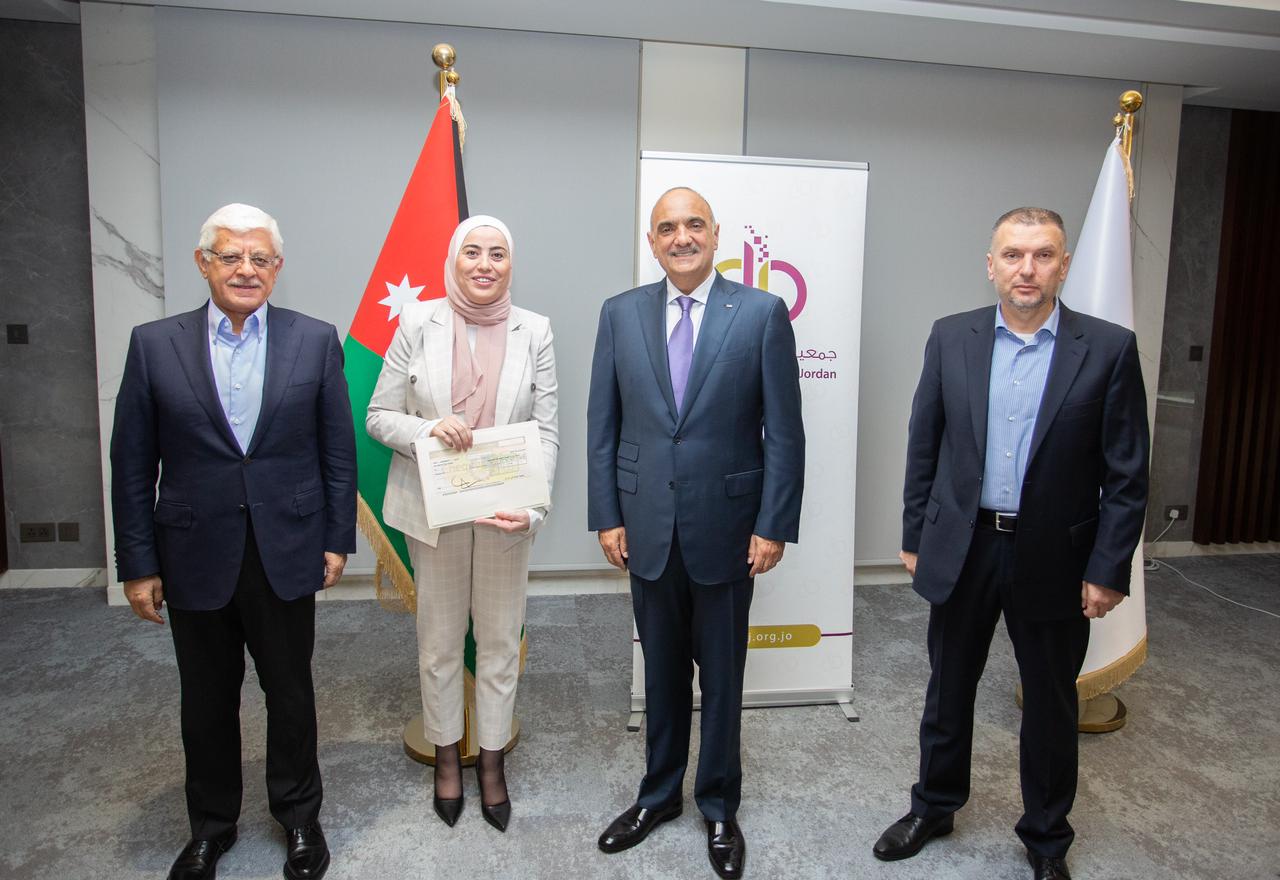
Amman, April 17 (Petra) – Under the patronage of Prime Minister Dr. Bishr Al-Khasawneh, ABJ announced, Monday evening, that banks have launched a 2 million Dinars initiative to support needy families through the Ministry of Social Development.
The initiative comes within the framework of the banks’ important role and belief in social responsibility, and community work. Banks are also committed to supporting social and development initiatives in the Hashemite Kingdom of Jordan.
The Prime Minister affirmed the significance of the banking sector for which which the government provides sustainability and development capabilities, pointing out that the sector is a main engine to support national economy and achieve targets included in reference documents in the second centenary of the Jordanian state including the document of economic modernization and doubling Growth rates and provision of financing and operational windows.
The Prime Minister pointed to the central role played by banks during the crisis and repercussions of the Corona pandemic which Jordan overcame with minimal losses and damages as banks provided the funding and liquidity necessary to finance government programs.
Al-Khasawneh stressed that banks perform many services within the framework of social responsibility whether through simple individual initiatives in villages and cities or activities through the banks’ combined basket such as the one witnessed today by providing 2 million Dinars to the Ministry of Social Development.
He pointed out that social responsibility is a cornerstone of the work of institutions as it took shape and form in many developed countries and began with the rules of stable custom in the Hashemite Kingdom of Jordan whether in the banking sector or other major institutions. The Premier stressed the importance of social responsibility in strengthening the values of community solidarity and achieving the required balance.
The Prime Minister affirmed the banking sector significance as it is an essential provider of support for the sustainability of the prudent and independent monetary policy that the Central Bank of Jordan has always carried out efficiently.
Al-Khasawneh pointed out that the solution to poverty and its ensuing unemployment lies in enabling investments praising the banks’ investment fund initiative and noting that the government has worked to strengthen the legislative and administrative framework that regulates, enables and facilitates the investment process.
He stressed the need for such similar initiatives to establish investment funds especially in the areas of innovation and leadership.
The Premier expressed hope that banks would provide easier SMEs financing and that they would have less traditional financing windows in approaching projects with venture capital or other designations. He said that there are legislative capabilities for this purpose to guarantee rights, including the adoption of the movable Funds Law as an insurance for the debt which allows banks to lend away from the traditional lending methods.
Al-Khasawneh expressed his thanks to the banking sector, of which we are proud as a basic partner with our industrial and commercial sectors within the framework of an integral equation and a necessary required balance for the continuation of societal harmony and the achievement of the renaissance that His Majesty King Abdullah II aspires for. Also, the private sector is an essential partner in enabling the government carry out its basic and central role and duty in serving citizens and achieve the required development.
In turn, the Minister of Social Development, Wafaa Bani Mustafa, appreciated the ABJ initiative of providing 2 million Dinars in support of needy social segments.
She stressed that this support will contribute to the efforts of the Ministry and its message of humanity, dignity and hope for the beneficiaries of the Ministry’s services.
She referred to what His Majesty King Abdullah II recently confirmed regarding the social protection axis being an essential part of the economic and social modernization paths, stressing that the current government is the most spender on social protection programs adding that “according to the World Bank and ESCWA, this government is the most efficient in spending on Social protection”.
The Governor of the Central Bank, Dr. Adel Sharkas, said that the banking sector in Jordan was fully aware of the importance of social responsibility, and was a pioneer in adopting community initiatives on a joint scale.
Dr. Sharkas pointed out that banks finance the Hussein Fund for Creativity and Excellence out of their desire to contribute to the development of the creative environment as well as support Al-Aman Fund for Orphan Care and the Jordanian Hashemite Fund for Human Development. This comes along to adopting social responsibility projects individually and directly according to banks’ special directions in supporting many fields such as education, health, human development, environment and others.
He stressed that banks bear their responsibilities towards society, not only for their humanitarian or societal role, but also as they represent an essential element for banks’ contribution to creating a sustainable economic environment that generates meaningful economic returns in the long term.
He stressed that the initial launch confirms banks’ interest and awareness of their role as a key partner with various local community institutions in adopting initiatives that create added social value.
Dr. Sharkas appreciated banks’ decision to provide the National Aid Fund with financial support enabling it to implement its programs and expand the scope of cash assistance to reach more needy families, as this fund has proven its success and efficiency over more than three decades in managing protection programs directed to needy families through frequent and emergency financial aid of all kinds.
He said that the concept of social responsibility in our current era is no longer limited to providing support and direct cash assistance, but has also expanded to include environmental sustainability practices, preserving natural resources and reducing pollution to benefit the environment and health in the long-term leading to development environment based on green economy.
He indicated that the Central Bank, in partnership with the banking and financial sector in Jordan, and with the assistance of international financial institutions, is close to completing the preparation of an integrated strategy for green financing in the Kingdom which is expected to be launched at the end of June 2023.
He stressed that this strategy will enhance other national efforts in this regard, especially the national plan for green growth in Jordan (2021-2025), which was prepared by the Ministry of Environment.
In addition, he called on banks to ensure that climate-related financial risks are adequately incorporated into banks’ risk management practices given the size, scope and time horizon of these risks.
ABJ President, Bassem Khalil Al-Salem, expressed his happiness with this initiative, and said: “We are committed to supporting the communities in which we operate, and we recognize the need of many families for support and assistance, and we look forward to providing the necessary aid to improve their lives and alleviate their suffering.” Stressing that the social responsibility of banks takes great momentum during the whole year and not only during the month of Ramadan.
Al-Salem said that this support comes as a collective initiative by banks within their multiple roles of social responsibility. He added that it seems from banks’ keenness to help needy families in conjunction with the end of the blessed month of Ramadan and the approach of Eid Al-Fitr.
He pointed out that the value of the support will be handed over to the Ministry of Social Development so that it can be distributed to the real beneficiaries of needy families and vulnerable groups in society, which would account for thousands of Jordanian families.
Al-Salem stressed that this campaign reflects banks’ commitment to support the communities they serve and reflects their influential role in n social responsibility and appreciation of the social challenges facing Jordanian society and the difficult economic conditions that many citizens go through. Also, he said that this contribution is integrated with many initiatives undertaken by banks to support the communities and reduce poverty and unemployment as well as improve the standard of living for needy families.
Al-Salem indicated that this campaign was agreed upon by all banks who showed high response, enthusiasm and great support for its implementation as a collective initiative under the umbrella of the Association of Banks.
Al-Salem stressed that such a large-scale collective initiative expresses banks’ deep sense of social responsibility and good citizenship. He also referred to the banks’ large contributions to the Himmat Watan Fund and to the Ministry of Health account during the Corona pandemic as well as the Corona vaccine campaigns in cooperation with Jordanian TV. Furthermore, banks launched martyr Muath Al-Kasasbeh scholarship and provided support for financial education curricula and for many national and charitable campaigns which are hard to mention all.
He added that such an initiative is a continuation of the many individual initiatives taken by banks in the field of social responsibility benefiting a large segment of citizens, national and educational institutions, and charities. He pointed out that banks practice social responsibility as a consistent and strategic institutional approach, and they develop integrated plans for social responsibility practices. Moreover, they implement and monitor the allocations and budgets necessary for achieving such a goal on an annual basis.
Dr. Maher Al-Mahrouq, ABJ Director, stressed the importance of banks in enhancing the resilience of the economy highlighting the need for banks’ continuous work as stopping turns the decline into a deep and long-term recession.
He pointed out that the structure and form of the banking sector and its mechanism of action confirm that ensuring its continuity is the only available option that must be focused on.
He stressed that social responsibility is at the core of the banks’ tasks in addition to qualitative and innovative initiatives in exceptional times, employment and investment in human capital, treasury financing, partnership projects, public and private sector projects, attracting savings, encouraging investment and distributing economic resources efficiently and effectively.
He noted that banks are working to provide various banking services, open channels for monetary policy, increase the effectiveness of economic policies, finance SMEs and sponsor social responsibility initiatives.
He revealed that the average annual spending of banks on social responsibility amounts to 30 million dinars, or 6% of banks’ net profits noting that the volume of banks’ spending in this field recorded 150 million Dinars during the period 2018 to 2022.





